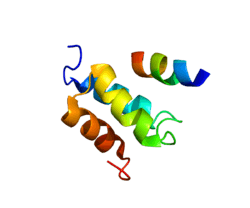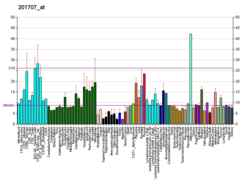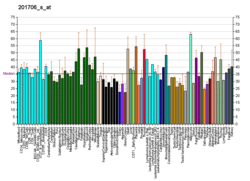PEX19
Peroxisomal biogenesis factor 19 is a protein that in humans is encoded by the PEX19 gene.[5][6][7]
Interactions
PEX19 has been shown to interact with:
gollark: See? Inefficient.
gollark: Not that it'll ever be used, but you know.
gollark: I'm going to work on a "safe mode" toggle for the network which switches security to maximum, shuts off wireless access, disconnects autocrafting, and cuts off the P2P controller, so it can only be accessed via the dedicated terminals.
gollark: You must have a really inefficient ME network, <@404656680496791554>.
gollark: Per tick or what?
References
- GRCh38: Ensembl release 89: ENSG00000162735 - Ensembl, May 2017
- GRCm38: Ensembl release 89: ENSMUSG00000003464 - Ensembl, May 2017
- "Human PubMed Reference:". National Center for Biotechnology Information, U.S. National Library of Medicine.
- "Mouse PubMed Reference:". National Center for Biotechnology Information, U.S. National Library of Medicine.
- Kammerer S, Arnold N, Gutensohn W, Mewes HW, Kunau WH, Höfler G, Roscher AA, Braun A (November 1997). "Genomic organization and molecular characterization of a gene encoding HsPXF, a human peroxisomal farnesylated protein". Genomics. 45 (1): 200–10. doi:10.1006/geno.1997.4914. PMID 9339377.
- Matsuzono Y, Kinoshita N, Tamura S, Shimozawa N, Hamasaki M, Ghaedi K, Wanders RJ, Suzuki Y, Kondo N, Fujiki Y (April 1999). "Human PEX19: cDNA cloning by functional complementation, mutation analysis in a patient with Zellweger syndrome, and potential role in peroxisomal membrane assembly". Proc Natl Acad Sci U S A. 96 (5): 2116–21. doi:10.1073/pnas.96.5.2116. PMC 26746. PMID 10051604.
- "Entrez Gene: PEX19 peroxisomal biogenesis factor 19".
- Mayerhofer PU, Kattenfeld T, Roscher AA, Muntau AC (March 2002). "Two splice variants of human PEX19 exhibit distinct functions in peroxisomal assembly". Biochem. Biophys. Res. Commun. 291 (5): 1180–6. doi:10.1006/bbrc.2002.6568. PMID 11883941.
- Gloeckner CJ, Mayerhofer PU, Landgraf P, Muntau AC, Holzinger A, Gerber JK, Kammerer S, Adamski J, Roscher AA (April 2000). "Human adrenoleukodystrophy protein and related peroxisomal ABC transporters interact with the peroxisomal assembly protein PEX19p". Biochem. Biophys. Res. Commun. 271 (1): 144–50. doi:10.1006/bbrc.2000.2572. PMID 10777694.
- Sacksteder KA, Jones JM, South ST, Li X, Liu Y, Gould SJ (March 2000). "PEX19 binds multiple peroxisomal membrane proteins, is predominantly cytoplasmic, and is required for peroxisome membrane synthesis". J. Cell Biol. 148 (5): 931–44. doi:10.1083/jcb.148.5.931. PMC 2174547. PMID 10704444.
- Biermanns M, Gärtner J (July 2001). "Targeting elements in the amino-terminal part direct the human 70-kDa peroxisomal integral membrane protein (PMP70) to peroxisomes". Biochem. Biophys. Res. Commun. 285 (3): 649–55. doi:10.1006/bbrc.2001.5220. PMID 11453642.
- Fransen M, Wylin T, Brees C, Mannaerts GP, Van Veldhoven PP (July 2001). "Human pex19p binds peroxisomal integral membrane proteins at regions distinct from their sorting sequences". Mol. Cell. Biol. 21 (13): 4413–24. doi:10.1128/MCB.21.13.4413-4424.2001. PMC 87101. PMID 11390669.
- Rual JF, Venkatesan K, Hao T, Hirozane-Kishikawa T, Dricot A, Li N, Berriz GF, Gibbons FD, Dreze M, Ayivi-Guedehoussou N, Klitgord N, Simon C, Boxem M, Milstein S, Rosenberg J, Goldberg DS, Zhang LV, Wong SL, Franklin G, Li S, Albala JS, Lim J, Fraughton C, Llamosas E, Cevik S, Bex C, Lamesch P, Sikorski RS, Vandenhaute J, Zoghbi HY, Smolyar A, Bosak S, Sequerra R, Doucette-Stamm L, Cusick ME, Hill DE, Roth FP, Vidal M (October 2005). "Towards a proteome-scale map of the human protein-protein interaction network". Nature. 437 (7062): 1173–8. doi:10.1038/nature04209. PMID 16189514.
Further reading
- Braun A, Kammerer S, Weissenhorn W, Weiss EH, Cleve H (1994). "Sequence of a putative human housekeeping gene (HK33) localized on chromosome 1". Gene. 146 (2): 291–5. doi:10.1016/0378-1119(94)90308-5. PMID 8076834.
- Götte K, Girzalsky W, Linkert M, Baumgart E, Kammerer S, Kunau WH, Erdmann R (1998). "Pex19p, a Farnesylated Protein Essential for Peroxisome Biogenesis". Mol. Cell. Biol. 18 (1): 616–28. doi:10.1128/MCB.18.1.616. PMC 121529. PMID 9418908.
- Sacksteder KA, Jones JM, South ST, Li X, Liu Y, Gould SJ (2000). "Pex19 Binds Multiple Peroxisomal Membrane Proteins, Is Predominantly Cytoplasmic, and Is Required for Peroxisome Membrane Synthesis". J. Cell Biol. 148 (5): 931–44. doi:10.1083/jcb.148.5.931. PMC 2174547. PMID 10704444.
- Gloeckner CJ, Mayerhofer PU, Landgraf P, Muntau AC, Holzinger A, Gerber JK, Kammerer S, Adamski J, Roscher AA (2000). "Human adrenoleukodystrophy protein and related peroxisomal ABC transporters interact with the peroxisomal assembly protein PEX19p". Biochem. Biophys. Res. Commun. 271 (1): 144–50. doi:10.1006/bbrc.2000.2572. PMID 10777694.
- Sugihara T, Kaul SC, Kato J, Reddel RR, Nomura H, Wadhwa R (2001). "Pex19p dampens the p19ARF-p53-p21WAF1 tumor suppressor pathway". J. Biol. Chem. 276 (22): 18649–52. doi:10.1074/jbc.C100011200. PMID 11259404.
- Fransen M, Wylin T, Brees C, Mannaerts GP, Van Veldhoven PP (2001). "Human Pex19p Binds Peroxisomal Integral Membrane Proteins at Regions Distinct from Their Sorting Sequences". Mol. Cell. Biol. 21 (13): 4413–24. doi:10.1128/MCB.21.13.4413-4424.2001. PMC 87101. PMID 11390669.
- Biermanns M, Gärtner J (2001). "Targeting elements in the amino-terminal part direct the human 70-kDa peroxisomal integral membrane protein (PMP70) to peroxisomes". Biochem. Biophys. Res. Commun. 285 (3): 649–55. doi:10.1006/bbrc.2001.5220. PMID 11453642.
- Mayerhofer PU, Kattenfeld T, Roscher AA, Muntau AC (2002). "Two splice variants of human PEX19 exhibit distinct functions in peroxisomal assembly". Biochem. Biophys. Res. Commun. 291 (5): 1180–6. doi:10.1006/bbrc.2002.6568. PMID 11883941.
- Fransen M, Brees C, Ghys K, Amery L, Mannaerts GP, Ladant D, Van Veldhoven PP (2002). "Analysis of mammalian peroxin interactions using a non-transcription-based bacterial two-hybrid assay". Mol. Cell. Proteomics. 1 (3): 243–52. doi:10.1074/mcp.M100025-MCP200. PMID 12096124.
- Ito M, Iidawa S, Izuka M, Haito S, Segawa H, Kuwahata M, Ohkido I, Ohno H, Miyamoto K (2004). "Interaction of a farnesylated protein with renal type IIa Na/Pi co-transporter in response to parathyroid hormone and dietary phosphate". Biochem. J. 377 (Pt 3): 607–16. doi:10.1042/BJ20031223. PMC 1223893. PMID 14558883.
- Jones JM, Morrell JC, Gould SJ (2004). "PEX19 is a predominantly cytosolic chaperone and import receptor for class 1 peroxisomal membrane proteins". J. Cell Biol. 164 (1): 57–67. doi:10.1083/jcb.200304111. PMC 2171958. PMID 14709540.
- Muntau AC, Roscher AA, Kunau WH, Dodt G (2004). Interaction of PEX3 and PEX19 visualized by fluorescence resonance energy transfer (FRET). Adv. Exp. Med. Biol. Advances in Experimental Medicine and Biology. 544. pp. 221–4. doi:10.1007/978-1-4419-9072-3_27. ISBN 978-1-4613-4782-8. PMID 14713233.
- Fransen M, Vastiau I, Brees C, Brys V, Mannaerts GP, Van Veldhoven PP (2004). "Potential role for Pex19p in assembly of PTS-receptor docking complexes". J. Biol. Chem. 279 (13): 12615–24. doi:10.1074/jbc.M304941200. PMID 14715663.
- Fang Y, Morrell JC, Jones JM, Gould SJ (2004). "PEX3 functions as a PEX19 docking factor in the import of class I peroxisomal membrane proteins". J. Cell Biol. 164 (6): 863–75. doi:10.1083/jcb.200311131. PMC 2172291. PMID 15007061.
- Colland F, Jacq X, Trouplin V, Mougin C, Groizeleau C, Hamburger A, Meil A, Wojcik J, Legrain P, Gauthier JM (2004). "Functional Proteomics Mapping of a Human Signaling Pathway". Genome Res. 14 (7): 1324–32. doi:10.1101/gr.2334104. PMC 442148. PMID 15231748.
- Shibata H, Kashiwayama Y, Imanaka T, Kato H (2004). "Domain architecture and activity of human Pex19p, a chaperone-like protein for intracellular trafficking of peroxisomal membrane proteins". J. Biol. Chem. 279 (37): 38486–94. doi:10.1074/jbc.M402204200. PMID 15252024.
External links
- GeneReviews/NCBI/NIH/UW entry on Peroxisome Biogenesis Disorders, Zellweger Syndrome Spectrum
- OMIM entries on Peroxisome Biogenesis Disorders, Zellweger Syndrome Spectrum
- Overview of all the structural information available in the PDB for UniProt: P40855 (Peroxisomal biogenesis factor 19) at the PDBe-KB.
This article is issued from Wikipedia. The text is licensed under Creative Commons - Attribution - Sharealike. Additional terms may apply for the media files.






